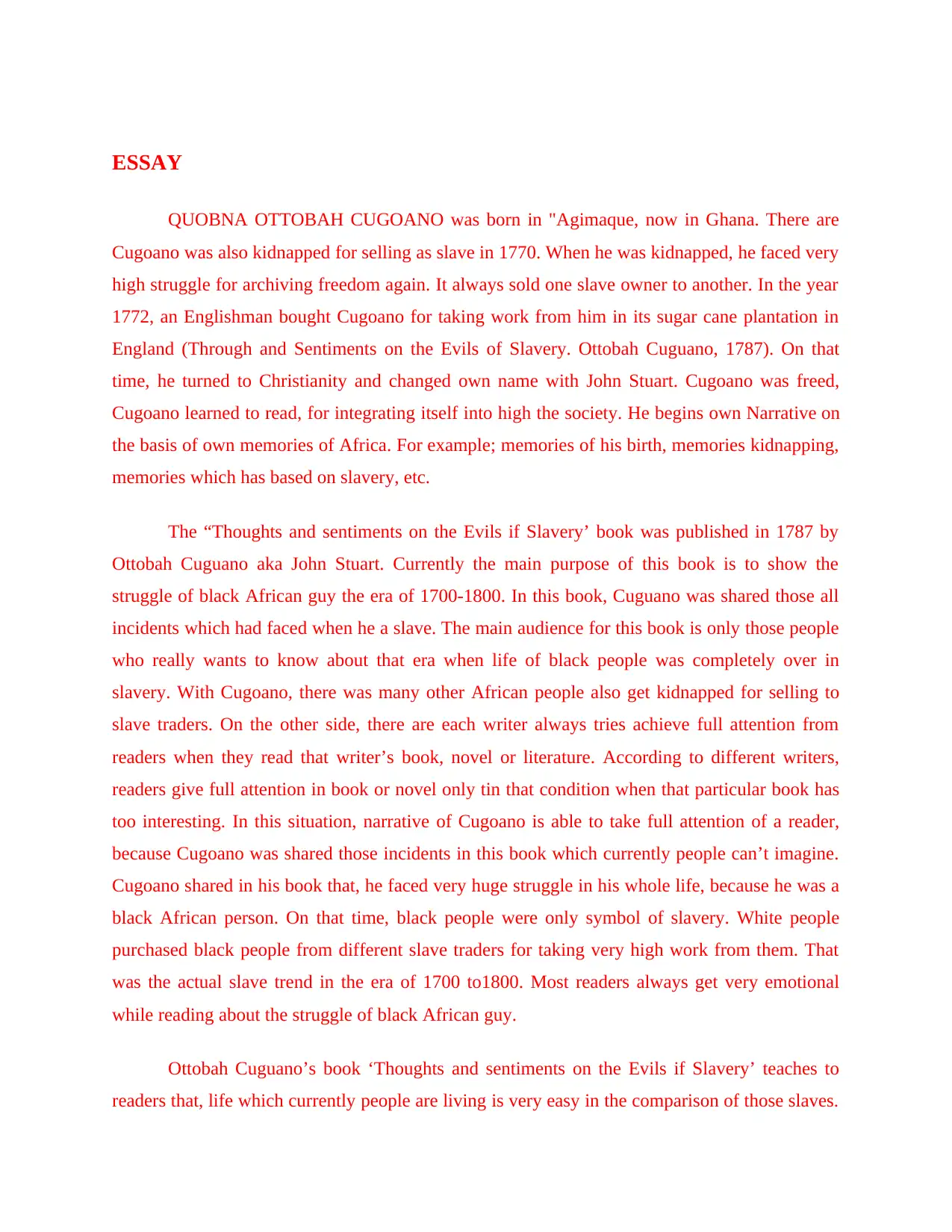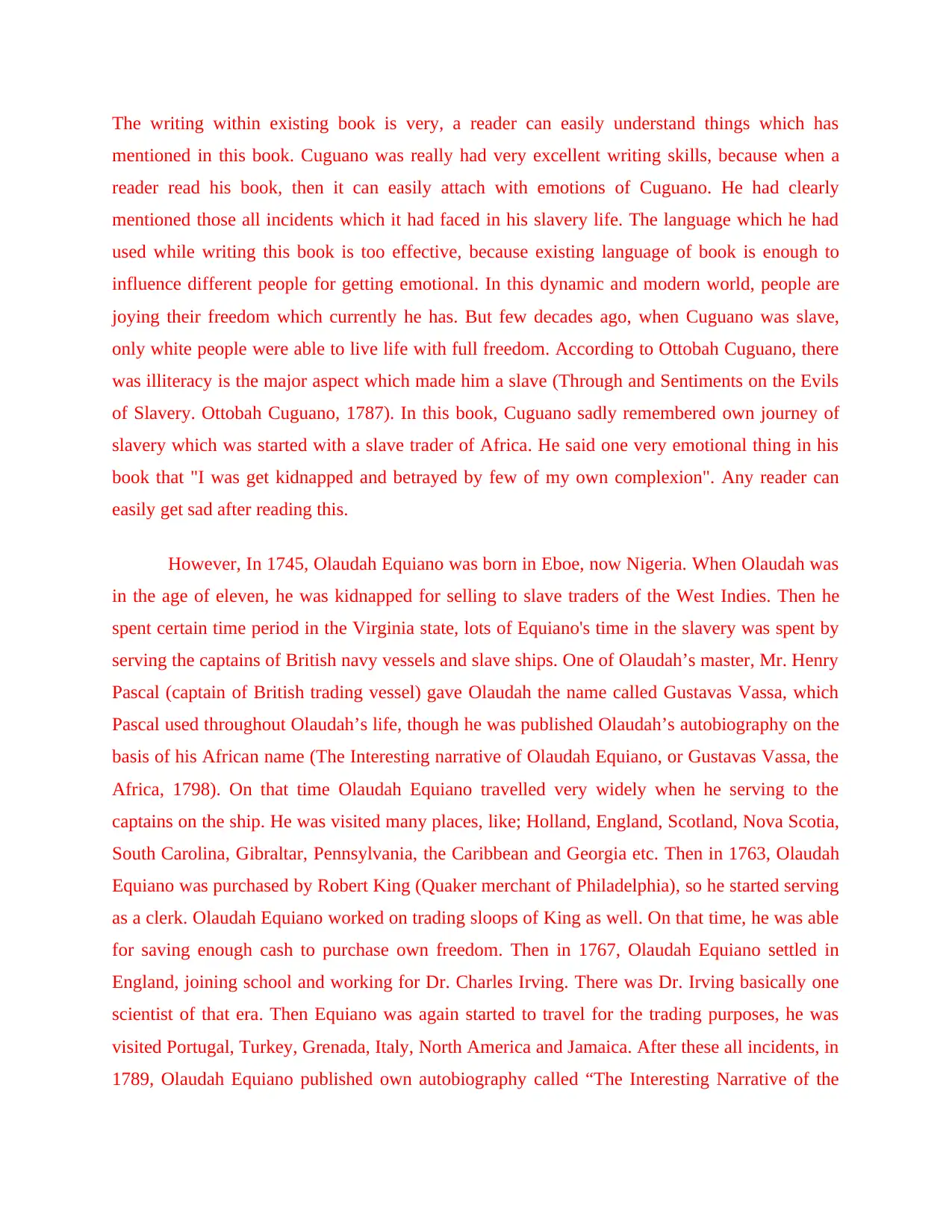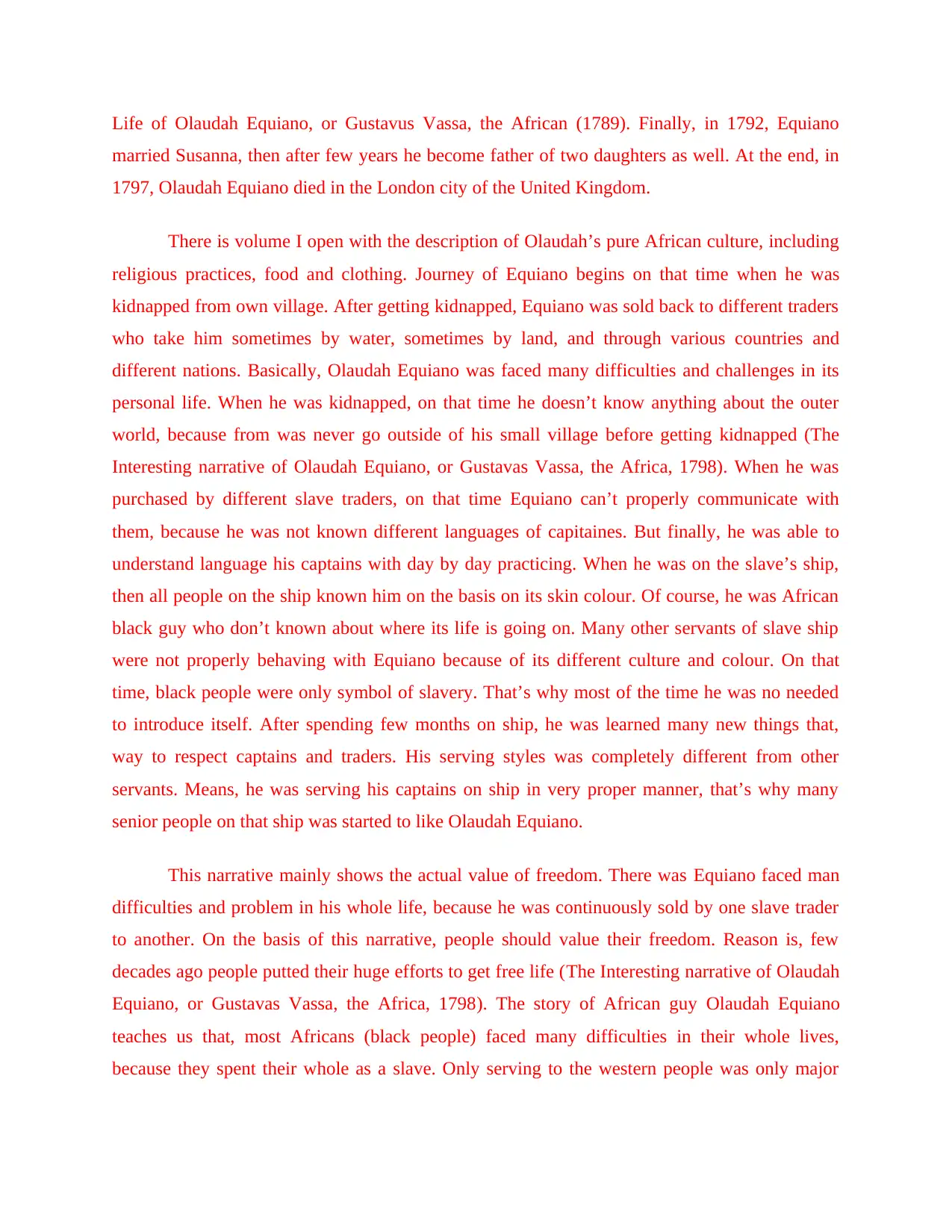Essay on the Narratives of Cugoano and Equiano on Slavery, History
VerifiedAdded on 2023/01/11
|7
|1653
|51
Essay
AI Summary
This essay provides a comparative analysis of the narratives of Ottobah Cugoano and Olaudah Equiano, focusing on their experiences with slavery. It examines their individual journeys from Africa to the West, highlighting the hardships they faced, including kidnapping, forced labor, and the loss of freedom. The essay delves into the historical context of the slave trade, exploring the social, economic, and political factors that contributed to the enslavement of Africans. It analyzes the themes of identity, resilience, and the struggle for freedom as portrayed in their autobiographies. Furthermore, the essay discusses the impact of their narratives in the abolitionist movement, emphasizing their role in raising awareness about the evils of slavery and advocating for its end. The essay concludes by reflecting on the enduring legacy of Cugoano and Equiano, and their contributions to the fight for human rights and social justice.

Assessment
Paraphrase This Document
Need a fresh take? Get an instant paraphrase of this document with our AI Paraphraser

TABLE OF CONTENTS
ESSAY.............................................................................................................................................3
REFERENCES................................................................................................................................7
ESSAY.............................................................................................................................................3
REFERENCES................................................................................................................................7

ESSAY
QUOBNA OTTOBAH CUGOANO was born in "Agimaque, now in Ghana. There are
Cugoano was also kidnapped for selling as slave in 1770. When he was kidnapped, he faced very
high struggle for archiving freedom again. It always sold one slave owner to another. In the year
1772, an Englishman bought Cugoano for taking work from him in its sugar cane plantation in
England (Through and Sentiments on the Evils of Slavery. Ottobah Cuguano, 1787). On that
time, he turned to Christianity and changed own name with John Stuart. Cugoano was freed,
Cugoano learned to read, for integrating itself into high the society. He begins own Narrative on
the basis of own memories of Africa. For example; memories of his birth, memories kidnapping,
memories which has based on slavery, etc.
The “Thoughts and sentiments on the Evils if Slavery’ book was published in 1787 by
Ottobah Cuguano aka John Stuart. Currently the main purpose of this book is to show the
struggle of black African guy the era of 1700-1800. In this book, Cuguano was shared those all
incidents which had faced when he a slave. The main audience for this book is only those people
who really wants to know about that era when life of black people was completely over in
slavery. With Cugoano, there was many other African people also get kidnapped for selling to
slave traders. On the other side, there are each writer always tries achieve full attention from
readers when they read that writer’s book, novel or literature. According to different writers,
readers give full attention in book or novel only tin that condition when that particular book has
too interesting. In this situation, narrative of Cugoano is able to take full attention of a reader,
because Cugoano was shared those incidents in this book which currently people can’t imagine.
Cugoano shared in his book that, he faced very huge struggle in his whole life, because he was a
black African person. On that time, black people were only symbol of slavery. White people
purchased black people from different slave traders for taking very high work from them. That
was the actual slave trend in the era of 1700 to1800. Most readers always get very emotional
while reading about the struggle of black African guy.
Ottobah Cuguano’s book ‘Thoughts and sentiments on the Evils if Slavery’ teaches to
readers that, life which currently people are living is very easy in the comparison of those slaves.
QUOBNA OTTOBAH CUGOANO was born in "Agimaque, now in Ghana. There are
Cugoano was also kidnapped for selling as slave in 1770. When he was kidnapped, he faced very
high struggle for archiving freedom again. It always sold one slave owner to another. In the year
1772, an Englishman bought Cugoano for taking work from him in its sugar cane plantation in
England (Through and Sentiments on the Evils of Slavery. Ottobah Cuguano, 1787). On that
time, he turned to Christianity and changed own name with John Stuart. Cugoano was freed,
Cugoano learned to read, for integrating itself into high the society. He begins own Narrative on
the basis of own memories of Africa. For example; memories of his birth, memories kidnapping,
memories which has based on slavery, etc.
The “Thoughts and sentiments on the Evils if Slavery’ book was published in 1787 by
Ottobah Cuguano aka John Stuart. Currently the main purpose of this book is to show the
struggle of black African guy the era of 1700-1800. In this book, Cuguano was shared those all
incidents which had faced when he a slave. The main audience for this book is only those people
who really wants to know about that era when life of black people was completely over in
slavery. With Cugoano, there was many other African people also get kidnapped for selling to
slave traders. On the other side, there are each writer always tries achieve full attention from
readers when they read that writer’s book, novel or literature. According to different writers,
readers give full attention in book or novel only tin that condition when that particular book has
too interesting. In this situation, narrative of Cugoano is able to take full attention of a reader,
because Cugoano was shared those incidents in this book which currently people can’t imagine.
Cugoano shared in his book that, he faced very huge struggle in his whole life, because he was a
black African person. On that time, black people were only symbol of slavery. White people
purchased black people from different slave traders for taking very high work from them. That
was the actual slave trend in the era of 1700 to1800. Most readers always get very emotional
while reading about the struggle of black African guy.
Ottobah Cuguano’s book ‘Thoughts and sentiments on the Evils if Slavery’ teaches to
readers that, life which currently people are living is very easy in the comparison of those slaves.
⊘ This is a preview!⊘
Do you want full access?
Subscribe today to unlock all pages.

Trusted by 1+ million students worldwide

The writing within existing book is very, a reader can easily understand things which has
mentioned in this book. Cuguano was really had very excellent writing skills, because when a
reader read his book, then it can easily attach with emotions of Cuguano. He had clearly
mentioned those all incidents which it had faced in his slavery life. The language which he had
used while writing this book is too effective, because existing language of book is enough to
influence different people for getting emotional. In this dynamic and modern world, people are
joying their freedom which currently he has. But few decades ago, when Cuguano was slave,
only white people were able to live life with full freedom. According to Ottobah Cuguano, there
was illiteracy is the major aspect which made him a slave (Through and Sentiments on the Evils
of Slavery. Ottobah Cuguano, 1787). In this book, Cuguano sadly remembered own journey of
slavery which was started with a slave trader of Africa. He said one very emotional thing in his
book that "I was get kidnapped and betrayed by few of my own complexion". Any reader can
easily get sad after reading this.
However, In 1745, Olaudah Equiano was born in Eboe, now Nigeria. When Olaudah was
in the age of eleven, he was kidnapped for selling to slave traders of the West Indies. Then he
spent certain time period in the Virginia state, lots of Equiano's time in the slavery was spent by
serving the captains of British navy vessels and slave ships. One of Olaudah’s master, Mr. Henry
Pascal (captain of British trading vessel) gave Olaudah the name called Gustavas Vassa, which
Pascal used throughout Olaudah’s life, though he was published Olaudah’s autobiography on the
basis of his African name (The Interesting narrative of Olaudah Equiano, or Gustavas Vassa, the
Africa, 1798). On that time Olaudah Equiano travelled very widely when he serving to the
captains on the ship. He was visited many places, like; Holland, England, Scotland, Nova Scotia,
South Carolina, Gibraltar, Pennsylvania, the Caribbean and Georgia etc. Then in 1763, Olaudah
Equiano was purchased by Robert King (Quaker merchant of Philadelphia), so he started serving
as a clerk. Olaudah Equiano worked on trading sloops of King as well. On that time, he was able
for saving enough cash to purchase own freedom. Then in 1767, Olaudah Equiano settled in
England, joining school and working for Dr. Charles Irving. There was Dr. Irving basically one
scientist of that era. Then Equiano was again started to travel for the trading purposes, he was
visited Portugal, Turkey, Grenada, Italy, North America and Jamaica. After these all incidents, in
1789, Olaudah Equiano published own autobiography called “The Interesting Narrative of the
mentioned in this book. Cuguano was really had very excellent writing skills, because when a
reader read his book, then it can easily attach with emotions of Cuguano. He had clearly
mentioned those all incidents which it had faced in his slavery life. The language which he had
used while writing this book is too effective, because existing language of book is enough to
influence different people for getting emotional. In this dynamic and modern world, people are
joying their freedom which currently he has. But few decades ago, when Cuguano was slave,
only white people were able to live life with full freedom. According to Ottobah Cuguano, there
was illiteracy is the major aspect which made him a slave (Through and Sentiments on the Evils
of Slavery. Ottobah Cuguano, 1787). In this book, Cuguano sadly remembered own journey of
slavery which was started with a slave trader of Africa. He said one very emotional thing in his
book that "I was get kidnapped and betrayed by few of my own complexion". Any reader can
easily get sad after reading this.
However, In 1745, Olaudah Equiano was born in Eboe, now Nigeria. When Olaudah was
in the age of eleven, he was kidnapped for selling to slave traders of the West Indies. Then he
spent certain time period in the Virginia state, lots of Equiano's time in the slavery was spent by
serving the captains of British navy vessels and slave ships. One of Olaudah’s master, Mr. Henry
Pascal (captain of British trading vessel) gave Olaudah the name called Gustavas Vassa, which
Pascal used throughout Olaudah’s life, though he was published Olaudah’s autobiography on the
basis of his African name (The Interesting narrative of Olaudah Equiano, or Gustavas Vassa, the
Africa, 1798). On that time Olaudah Equiano travelled very widely when he serving to the
captains on the ship. He was visited many places, like; Holland, England, Scotland, Nova Scotia,
South Carolina, Gibraltar, Pennsylvania, the Caribbean and Georgia etc. Then in 1763, Olaudah
Equiano was purchased by Robert King (Quaker merchant of Philadelphia), so he started serving
as a clerk. Olaudah Equiano worked on trading sloops of King as well. On that time, he was able
for saving enough cash to purchase own freedom. Then in 1767, Olaudah Equiano settled in
England, joining school and working for Dr. Charles Irving. There was Dr. Irving basically one
scientist of that era. Then Equiano was again started to travel for the trading purposes, he was
visited Portugal, Turkey, Grenada, Italy, North America and Jamaica. After these all incidents, in
1789, Olaudah Equiano published own autobiography called “The Interesting Narrative of the
Paraphrase This Document
Need a fresh take? Get an instant paraphrase of this document with our AI Paraphraser

Life of Olaudah Equiano, or Gustavus Vassa, the African (1789). Finally, in 1792, Equiano
married Susanna, then after few years he become father of two daughters as well. At the end, in
1797, Olaudah Equiano died in the London city of the United Kingdom.
There is volume I open with the description of Olaudah’s pure African culture, including
religious practices, food and clothing. Journey of Equiano begins on that time when he was
kidnapped from own village. After getting kidnapped, Equiano was sold back to different traders
who take him sometimes by water, sometimes by land, and through various countries and
different nations. Basically, Olaudah Equiano was faced many difficulties and challenges in its
personal life. When he was kidnapped, on that time he doesn’t know anything about the outer
world, because from was never go outside of his small village before getting kidnapped (The
Interesting narrative of Olaudah Equiano, or Gustavas Vassa, the Africa, 1798). When he was
purchased by different slave traders, on that time Equiano can’t properly communicate with
them, because he was not known different languages of capitaines. But finally, he was able to
understand language his captains with day by day practicing. When he was on the slave’s ship,
then all people on the ship known him on the basis on its skin colour. Of course, he was African
black guy who don’t known about where its life is going on. Many other servants of slave ship
were not properly behaving with Equiano because of its different culture and colour. On that
time, black people were only symbol of slavery. That’s why most of the time he was no needed
to introduce itself. After spending few months on ship, he was learned many new things that,
way to respect captains and traders. His serving styles was completely different from other
servants. Means, he was serving his captains on ship in very proper manner, that’s why many
senior people on that ship was started to like Olaudah Equiano.
This narrative mainly shows the actual value of freedom. There was Equiano faced man
difficulties and problem in his whole life, because he was continuously sold by one slave trader
to another. On the basis of this narrative, people should value their freedom. Reason is, few
decades ago people putted their huge efforts to get free life (The Interesting narrative of Olaudah
Equiano, or Gustavas Vassa, the Africa, 1798). The story of African guy Olaudah Equiano
teaches us that, most Africans (black people) faced many difficulties in their whole lives,
because they spent their whole as a slave. Only serving to the western people was only major
married Susanna, then after few years he become father of two daughters as well. At the end, in
1797, Olaudah Equiano died in the London city of the United Kingdom.
There is volume I open with the description of Olaudah’s pure African culture, including
religious practices, food and clothing. Journey of Equiano begins on that time when he was
kidnapped from own village. After getting kidnapped, Equiano was sold back to different traders
who take him sometimes by water, sometimes by land, and through various countries and
different nations. Basically, Olaudah Equiano was faced many difficulties and challenges in its
personal life. When he was kidnapped, on that time he doesn’t know anything about the outer
world, because from was never go outside of his small village before getting kidnapped (The
Interesting narrative of Olaudah Equiano, or Gustavas Vassa, the Africa, 1798). When he was
purchased by different slave traders, on that time Equiano can’t properly communicate with
them, because he was not known different languages of capitaines. But finally, he was able to
understand language his captains with day by day practicing. When he was on the slave’s ship,
then all people on the ship known him on the basis on its skin colour. Of course, he was African
black guy who don’t known about where its life is going on. Many other servants of slave ship
were not properly behaving with Equiano because of its different culture and colour. On that
time, black people were only symbol of slavery. That’s why most of the time he was no needed
to introduce itself. After spending few months on ship, he was learned many new things that,
way to respect captains and traders. His serving styles was completely different from other
servants. Means, he was serving his captains on ship in very proper manner, that’s why many
senior people on that ship was started to like Olaudah Equiano.
This narrative mainly shows the actual value of freedom. There was Equiano faced man
difficulties and problem in his whole life, because he was continuously sold by one slave trader
to another. On the basis of this narrative, people should value their freedom. Reason is, few
decades ago people putted their huge efforts to get free life (The Interesting narrative of Olaudah
Equiano, or Gustavas Vassa, the Africa, 1798). The story of African guy Olaudah Equiano
teaches us that, most Africans (black people) faced many difficulties in their whole lives,
because they spent their whole as a slave. Only serving to the western people was only major

function of most African people on that time. The conclusion of this narrative is, people should
joy their freedom, because many years ago only few lucky people was able to live a free life.
Both was faced lots of struggle in their respective life. Due to modernisation and higher
standard of literacy, now black people have full rights as white people at any place. But that time
was really very tough to black people.
joy their freedom, because many years ago only few lucky people was able to live a free life.
Both was faced lots of struggle in their respective life. Due to modernisation and higher
standard of literacy, now black people have full rights as white people at any place. But that time
was really very tough to black people.
⊘ This is a preview!⊘
Do you want full access?
Subscribe today to unlock all pages.

Trusted by 1+ million students worldwide

REFERENCES
Books & Journals
The Interesting narrative of Olaudah Equiano, or Gustavas Vassa, the African (1798)
Through and Sentiments on the Evils of Slavery. Ottobah Cuguano (1787)
Books & Journals
The Interesting narrative of Olaudah Equiano, or Gustavas Vassa, the African (1798)
Through and Sentiments on the Evils of Slavery. Ottobah Cuguano (1787)
1 out of 7
Your All-in-One AI-Powered Toolkit for Academic Success.
+13062052269
info@desklib.com
Available 24*7 on WhatsApp / Email
![[object Object]](/_next/static/media/star-bottom.7253800d.svg)
Unlock your academic potential
Copyright © 2020–2025 A2Z Services. All Rights Reserved. Developed and managed by ZUCOL.


